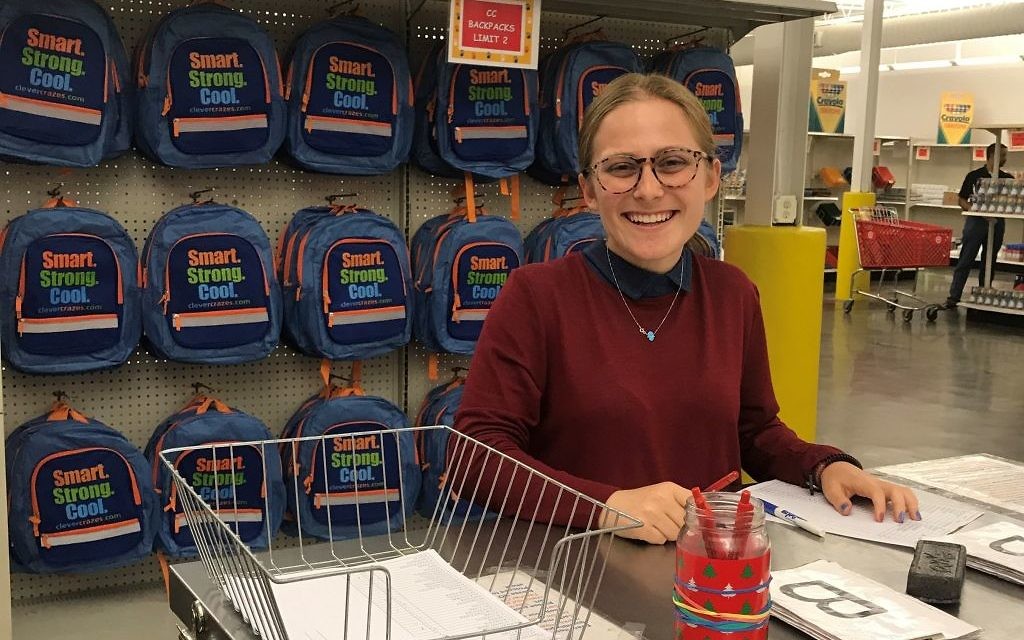AJA Student President Battles Hunger
Despite countless resources, hunger remains prevalent issue within community.

Maayan Schoen’s father is a civil rights lawyer, so the Atlanta Jewish Academy senior has grown up with an interest in civil rights that has led her to volunteer at the Atlanta Community Food Bank and promote causes that improve the community.
During the summer after 10th grade, Schoen had an opportunity to intern at the National Center for Civil and Human Rights, which has a partnership with Atlanta Jewish Academy, where she participated in seminars related to civil and human rights.
But Schoen was drawn to the Atlanta Community Food Bank’s workshops, which she began facilitating within AJA’s No Place for Hate program after contacting the organization’s education and outreach coordinators.
Get The AJT Newsletter by email and never miss our top stories Free Sign Up
“I was educated on some incredible causes at the CCHR, and as much as I would love to get involved with all of them, I realized the greatest impact, in terms of what I could bring to the community, was hunger,” Schoen said. “Hunger has a unique qualification, and although we sympathize with many causes across the world, we empathize with hunger, as it is universal. A child understands hunger as much as an adult does, and once people realize how practical it is, they will become more engaged to help combat it.”
While visiting a Mazon: A Jewish Response to Hunger exhibit in spring 2016, Schoen found that her interest in hunger combined with her love of Judaism.
“The exhibit was fabulous, and after speaking with the facilitator, I realized that some of the things I grew up learning in the Jewish community impacted my involvement with the ACFB,” she said. “The Mazon exhibit was really powerful but also helped me discover some various resources readily available within the community.”
The food bank fights hunger by engaging, educating and empowering people within the community, an approach that Schoen said fits with the Jewish notion of tikkun olam (repairing the word). “The more we educate and empower people, the more likely they are to become engaged by volunteering, signing up for hunger marches and promoting food drives at schools and shuls.”
Since volunteering at the food bank, Schoen has created numerous programs on hunger through her role as AJA’s student council president and No Place for Hate board member. She has invited educators to facilitate hunger simulations that match students and people who can’t afford sufficient food during daily tasks.
“Kids understand the gravity of the situation and immediately come on board to see how they can get further involved,” Schoen said. “This was a great way to increase awareness as students received a firsthand account of the issues. This form of experiential learning is important for any cause but is the most accessible for all ages.”
In addition to facilitating workshops at AJA, Schoen has contacted other Jewish organizations to make a greater impact in the community. With Friendship Circle she is working on a volunteer day tailored to the abilities of people within the organization.
She has reached out to Jewish Kids Groups to establish a Jewish Family & Career Services project.
“The response has been fantastic, and I am working with countless leaders to continue to help set up workshops, sign up for marches or set up a booth at any upcoming carnivals shuls may have,” Schoen said.
“Hunger is an issue that is prevalent within my own community, and yet I’ve learned that despite having so much food around the world today hunger, remains an ongoing issue,” she said. “So much of our culture, observance and tradition revolves around food; it is more than just eating to be healthy. Each person knows the meaning food has for them. Whether it includes a memory associated with their grandmother’s chocolate-chip cookie or matzah ball soup, the experience of food is very relatable and something present in our lives.”
While volunteering with the food bank, Schoen also assisted Kids in Need, which provides free school supplies to teachers if more than half their students qualify for free or reduced-price lunches.
“The entire experience for these teachers, from start to finish, is great as they walk out feeling confident they are able to provide a little bit more to their students,” said Schoen, who also has volunteered at the Toco Hills Community Alliance, which provides hot meals and groceries to those in need.
She said the food bank is trying to accommodate dietary laws such as kashrut in the belief that religious observance should never be a barrier to receiving needed food. She added that the food bank has a system to select food on a health scale to provide nutritional options.
“The way in which my family, schools and shuls have operated has always taught me that we are about something bigger than ourselves,” Schoen said. “The entire world is our domain and responsibility to take care of. Even if we don’t state tikkun olam, none of our actions are isolated. Nothing should ever feel detached to us, as any global or human issue is inevitably our issue, especially concerning hunger right here in our back yard. I am incredibly thankful to have worked with the ACFB and in turn share what I learned with the community.”




comments